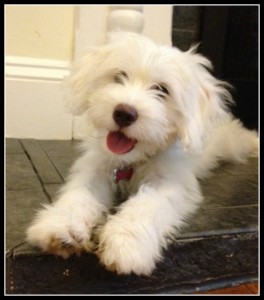A puppy can be trained to be a faithful and loving companion. So can your mind.
Practitioners of meditation often use the term “monkey mind” to describe the untrained mind: a mind that grasps wildly and randomly at whatever passes through its consciousness; a mind that seizes greedily at every passing thought; a mind unaware of itself and the dangers it may encounter.
I am a practitioner of meditation. I have had the experience of monkey mind, but frankly, not a whole lot of experience with monkeys themselves outside of zoos and National Geographic documentaries.
On the other hand, I do have some experience with another kind of wild life. Specifically, puppies, since I am currently the proud, delighted (and sometimes frustrated) owner of a little white puffball of love — a Westie/Spaniel mix named Lucy. I like to say that at her not-so-advanced age of four months, Lucy is ten pounds of cute and five pounds of trouble. It’s not a bad ratio really. The cute outweighs the trouble be two-to-one, so she is twice as adorable as she is naughty. As a consequence, we forgive her for her trespasses. A lot.
My experience with Lucy has led me to change the term “monkey mind” to “puppy mind”.
Here are a few of the many ways that Lucy’s not-always-so-adorable behavior exemplifies an untrained, unconscious mind:
- Lucy will run after anything that moves. It doesn’t matter what it is — dust bunny, bug, the cat, her owners’ footsteps — if it moves, it’s worth chasing. “Puppy mind” will do the same. Any thought is worth following, no matter how random or unimportant. If it fleets through your consciousness, you go after it as if it matters. Some thoughts are worth following. Others not. Following a bug will lead you into a dark corner and may even leave you with a nasty sting. Following your beloved master will lead you to pats, water, and food (love, refreshment, and nourishment!) It’s important to know the difference between a random pest and your beloved.
- Lucy will try to eat anything, regardless of whether it nourishes or hurts her. I honestly do keep the house picked up. But with four children in the house, things are bound to hit the floor. And it only takes a millisecond for Lucy to find them. Here are some things I have pulled out of Lucy’s mouth in the past couple of weeks: A spool of thread. A sewing needle (Yikes!). A crystal pendant. A nickel. Another nickel. In fact, things that are bad for her are somehow instinctively more appealing than the food placed lovingly in her bowl: she’ll boycott her food and at the same time, happily pull the stuffing out of her her bed. “Puppy mind” also can not distinguish between thoughts that are nourishing and thoughts that can cause serious damage. Just like Lucy, if it’s within easy reach, we’ll chew on it. Doesn’t matter if it’s replenishing or dangerous. So we may boycott the deeply nourishing thought, “Wow! Life is a miracle and I am so grateful to be a part of it,” but we can chew on, “My boss is such an a**shole,” all day long. Go figure.
- When Lucy is in pain, she will take it out on whatever is in range. Poor thing is teething. And when she hurts she will chew on anything. The couch. The coffee table. A sock. A shoe. Our twelve-year-old dachsund’s tail (which never goes well for her!) And yes, sometimes even her toys. A puppy mind in pain will try to relieve its suffering by lashing out at whatever is in closest range. It experiences pain and blames whatever is in view and will often attempt to inflict pain as a way of relieving itself of its pain. There are healthy ways of dealing with pain (chew toys) and unhealthy ways of dealing with pain (taking the stuffing out of the bed that is meant to provide you comfort and rest or sinking your teeth into another dog who is likely to snap back). Pain is bound to occur in our lives. It is part of our being human. But if we are wise, we will learn that there are healthy outlets for pain — and outlets for pain that will destroy your sources of comfort and deepen the experience of pain. It’s important to know the difference in your life.
- But most importantly, Lucy is learning. Lucy is learning some important commands, namely: “Drop it!”, “Leave it!” and “GRRRRRRRR!” When she picks up something she shouldn’t we tell her to drop it. When she looks like she is even thinking about picking up something she shouldn’t we tell her to leave it. And when she crosses a boundary with her dachsund brother, he gives her a warning growl so she’ll know that if she persists, pain is on its way. Those of us with “puppy mind” (and that would be all of us!) can learn the same. If we start to gnaw on an unsavory thought we can tell ourselves “Drop it!” If we are tempted to ingest feelings that are hazardous to our mental and emotional health, we can tell ourselves, “Leave it.” And when life bares its teeth and gives us a little warning growl, back off before you find yourself in a world of suffering. If little Lucy can learn, by golly, so can you!
Train your “puppy mind” with love and patience. Have confidence that it can be your dear and beloved companion. Give it a pat. A scratch behind the ears. A yummy treat. And a rousing cheer of “Who’s a good puppy?!”
And may your life be twice as lovable as it is trouble.







